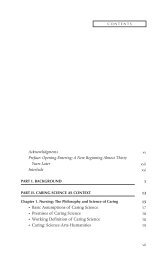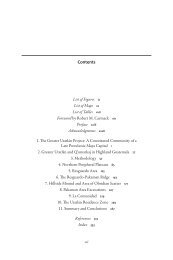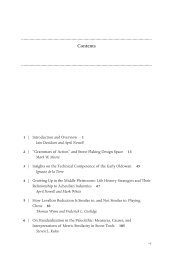free download - University Press of Colorado
free download - University Press of Colorado
free download - University Press of Colorado
You also want an ePaper? Increase the reach of your titles
YUMPU automatically turns print PDFs into web optimized ePapers that Google loves.
Social Evolution, Hazards, and Resilience<br />
So if larger groups have such great advantages, why weren’t there any Paleolithic<br />
empires Of course, there are very important counterbalancing forces<br />
that prevent groups from becoming ever larger. Robert Carneiro (1987) and,<br />
more recently, Matthew Bandy (2008) have emphasized the strong tendency<br />
for groups to fission because <strong>of</strong> “scalar stress” (internal dissension) once they<br />
reach a certain size. Bandy, for example, suggests that “only the development<br />
<strong>of</strong> novel institutions <strong>of</strong> social integration at a suprahousehold level [Service’s<br />
intra-tribal sodalities come to mind] could make possible the emergence <strong>of</strong><br />
villages larger than [a] critical population threshold” (2008: 341). Small-scale<br />
human societies have a strong egalitarian ethos that also resists the development<br />
<strong>of</strong> internal inequalities, and they regularly employ public opinion and<br />
“punitive moral sanctioning to ensure that alpha-dominated hierarchies could<br />
not form” (Boehm 2000: 213). Also, large groups that are relatively sedentary<br />
may degrade their local environments more than did their less numerous, more<br />
mobile ancestors. Environmental degradation surrounding newly large and<br />
sedentary populations therefore presents another common barrier to growth,<br />
as Meredith Matthews and I (Kohler and Matthews 1988) argued for some<br />
early villages in the US Southwest.<br />
I use the phrase social construction work for all those social and political<br />
processes that allow groups to grow larger, overcoming the probability <strong>of</strong> fission<br />
and the difficulties <strong>of</strong> cooperation and communication within ever larger groups<br />
and avoiding the environmental degradation that accompanies growth. Social<br />
construction processes are what people use to build and maintain groups.<br />
What do these processes include Very small groups can be built on the<br />
ancient biological (genetic) logic <strong>of</strong> inclusive fitness (or kin selection): we are<br />
genetically programmed to be biased toward helping those to whom we are<br />
related. But such motivations decay quickly as groups expand beyond just a<br />
few households; I’m much more likely to help my brother than help my third<br />
cousin. Kim Hill and colleagues (2011) have recently shown that contemporary<br />
hunter-gatherer bands are composed <strong>of</strong> mostly unrelated people, though<br />
they <strong>of</strong>ten include adult brothers and sisters. If this was also true <strong>of</strong> ancient<br />
foragers, then the logic <strong>of</strong> inclusive fitness plays only a very small part in the<br />
story <strong>of</strong> how we evolved to cooperate so efficiently.<br />
As we move in size beyond the scale at which inclusive fitness can be effective,<br />
myriad potential mechanisms for inducing and sustaining cooperation<br />
within groups have been suggested by economists, political scientists, physicists,<br />
and game theoreticians. A partial list includes mutualism, conditional reciprocity,<br />
indirect reciprocity, “strong reciprocity,” and reputation management,<br />
including signaling. These mechanisms interact in complicated ways with levels<br />
<strong>of</strong> selection, for example, if they rely—as many do—on the existence <strong>of</strong> underlying<br />
norms or institutions whose existence might depend on prior (cultural)<br />
group selection or if they tend to be effective in stabilizing those same norms.<br />
227





